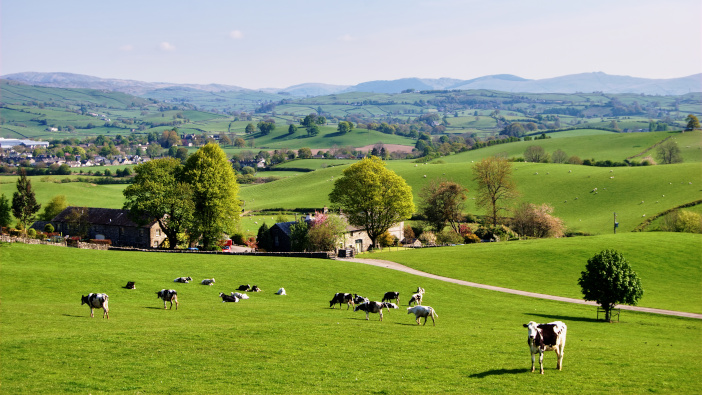Agricultural faculties in universities and colleges have collated data for the Defra-funded Farm Business Survey (FBS) for the past 85 years, which has had a significant impact on the industry.
It brings together data on the physical, economic and environmental performance of businesses in England, built into anonymous data sets to inform government, policymakers, educators, researchers and farmers.
Most recently it has been used to inform the Agriculture Act 2020, said Charles Scott, head of the FBS Unit at Newcastle University, which is part of the group that collates the data. “Very important areas of investigation have previously included the reliance on direct payments in various forms, as well as diversification and the extent to which it supports agricultural activities.”
Robin Jackson, director of Rural Business Research (RBR) at Duchy College, highlighted that it’s not just government that benefits from this information. “Industry bodies – like the NFU and CLA – and multiple allied steering groups draw on information generated from the FBS – like the Enterprise reports and Defra’s Farm Business Income (FBI) report,” he said. “So do notable publications like Anderson’s John Nix Pocket Book.”
And information from the FBS reaches consultants, researchers, educators, veterinary professionals and farm businesses who use it in their services, research, teachings and advice. “It helps to refresh the teaching of future farmers and growers and those in associated industries,” added Mr Jackson.
It was formed in 1936 as the Farm Management Survey by the Ministry of Agriculture and Fisheries (MAF 1919 to 1955) and has always been carried out by independent universities and colleges.
“It was created to keep a finger on the pulse of agriculture at a time, post World War I and during the depression, when there was a concerted effort to pursue facts and figures in relation to different theories and methods to validate societal economics,” said Mr Jackson.

Maintained over the decades, the Survey has been used to inform policy but has been seen to have the potential to be transformative for the industry. Further justification was found in 1973 when the UK joined the European Union and the data was used to contribute to the European Farm Accountancy Data Network.
“It has informed government through wars and geopolitical turmoil – going into and out of the European Union – as well as through financial crises like recessions and other traumatic events like foot-and-mouth and the Covid-19 pandemic,” explained Mr Jackson.
To date, the FBS remains commissioned by the government and is the largest research survey focused on farming and horticulture businesses in England. Until this year, for eighteen years, it has been undertaken by Rural Business Research (RBR), a non-profit partnership of six university and college research units.
“It’s a stratified randomised approach,” said Mr Scott. “Farms are drawn from a list based on the June Census, sampling at about 2.5% of the farming population. The FBS data represents 90% of England’s farmed area and agricultural output.
“For most, the incentive to get involved is having a free management account with detailed benchmarking ability. Farmers are able to benchmark against their peers – similar local farm types and business models – and are then able to take that information and benchmark regionally and nationally.”
Whether they take part or not, farmers can access benchmarking information for free, explained Laura Black, vice principal at Askham Bryan College.
“They can go to the FBS website and benchmark against similar business models; nation, farm type and tenure, by inputting their details – which won’t be stored or shared.”
A lot of farms take part for a long time, said Caroline Lambourne, head of the FBS unit at Duchy College. “We used to run a 15-year cut-off – which we don’t anymore – but that shows just how long some farms remain and the value held by farm businesses.”
The FBS enables information about the sector – which can be difficult to gain in other ways – to be accessed, explained Mr Jackson. “We don’t make decisions for government; it is for them to base decisions around the data we provide which is rigorous, statistically relevant, and – crucially – independent.”
Ben Lang, head of the FBS RBR unit at Cambridge University, added that the partnership between universities and colleges has aided the co-development of methodology to enhance accuracy and reliability.
“Farmers are facing a multitude of operational and financial challenges. The survey turns that into hard data that demonstrates farmers’ experiences and can be reflected directly to the government to explain what’s going on,” said Mr Lang.
It collects over 2,000 variables and has documented experiences through policy changes like the multiple crises throughout the Common Agricultural Policy, the introduction of environmental schemes, and the challenges of Brexit.
Defra has now awarded the next FBS contract to agricultural consultancy Promar International. Paul Wilson, chief executive of RBR and professor of agricultural economics at the University of Nottingham, has led the FBS since 2006 and says the RBR’s legacy will be felt for many years.
“This includes the skills and expertise of the university and college staff who transfer to work for Promar. The FBS sample continuity will be enhanced through farmers who choose to continue to take part in the survey.
“The methodologies in the FBS draw upon 86 years’ experience and intellectual input from our university and college institutions. This has played a key role in the rigorous data and analytical protocols that underpin the delivery of the quality FBS data.
“We hope that our collective insight and experience will be retained within the FBS as it continues to serve the needs of Defra, farmers and growers, and the wider industry at this important time in our agricultural history and development.”


